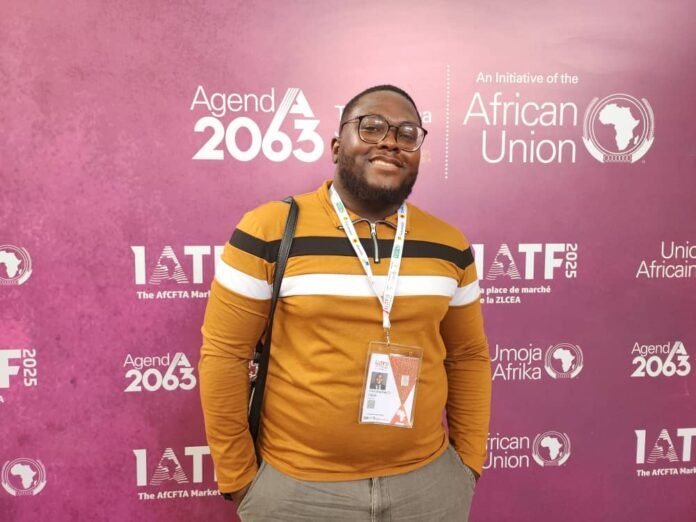ALGIERS, ALGERIA-In the corridors of the Intra-African Trade Fair (IATF2025), where deals worth billions are being shaped and sealed, the voice of a Liberian entrepreneur is standing out not just for his bold startup vision, but for his powerful call to action for Africa’s future in trade.
Christopher O. Fallah, founder and CEO of Annita, a pan-African digital platform integrating e-commerce, logistics, and essential services into a unified ecosystem, is championing a message that resonates deeply with many African entrepreneurs: trade within Africa must be simplified for Africans.
Amidst over $40 billion in potential investment capital circulating at the trade fair, Fallah has been relentless in attending panel discussions, particularly those centered around the African Continental Free Trade Area (AfCFTA), Africa’s most ambitious trade initiative aimed at creating a single market for goods and services across 54 countries.
“I believe doing business in Africa should be easy for Africans,” Fallah said during a side conversation after a panel on AfCFTA. “We’re not crossing continents. We’re operating on our own soil. This shouldn’t be something we have to break a sweat over.”
For Fallah, who is at IATF2025 not just as an exhibitor but also a panelist and ambassador for Liberia’s entrepreneurial spirit, the AfCFTA holds immense promise. It could mean seamless trade routes, unified regulations, reduced tariffs, and accelerated growth for startups like Annita that are built on continental integration.
But, he argues, the framework still poses challenges that need to be addressed, especially for entrepreneurs from smaller economies like Liberia, where GDP and population size can often be seen as deterrents by investors.
“Yes, Liberia is a small market, and that makes funding hard to come by. But if you secure that one funding, you open the door not just for yourself, but for an entire ecosystem,” he said. “That’s why I’m here. Not just for me, but for Liberia.”
During an AfCFTA panel, Fallah posed a critical question that highlighted both the curiosity and confusion surrounding the agreement: “If someone came across the AfCFTA today, what would they know about associated costs, and what steps are necessary to be fully embedded in the framework?”
His point was simple but striking: entrepreneurs need clarity, transparency, and practical tools to take advantage of this landmark trade agreement. Without that, AfCFTA risks becoming a great idea with limited grassroots implementation.
Through Annita, Fallah is building a model of what AfCFTA could look like in action, a borderless digital platform where small businesses and individuals can access services traditionally spread across multiple providers, at no extra cost.
His strategy at IATF2025 is to forge partnerships and networks with venture capitalists, policymakers, and business leaders from Algeria and beyond. These connections, he hopes, will lead to investment, collaboration, and long-term results that will ripple far beyond the trade fair.
“Being here means something is shifting,” Fallah said. “Liberian entrepreneurs have a greater destiny ahead. We’re starting the journey now by creating these networks, and soon others will walk this same path more easily.”
Fallah’s presence and perspective at IATF2025 underscore a critical moment for the AfCFTA: the need to move from policy to practicality. Entrepreneurs are ready. The infrastructure is developing. The investment is available.
What’s needed now is a more inclusive and accessible framework, one that speaks directly to the hustlers, innovators, and digital pioneers like Fallah who are already building Africa’s future.
“AfCFTA must not become a policy that lives only in government halls,” he said. “It has to be something every entrepreneur can feel, use, and benefit from, whether you’re in Monrovia, Algiers, or elsewhere.
By: Anthony Williams

